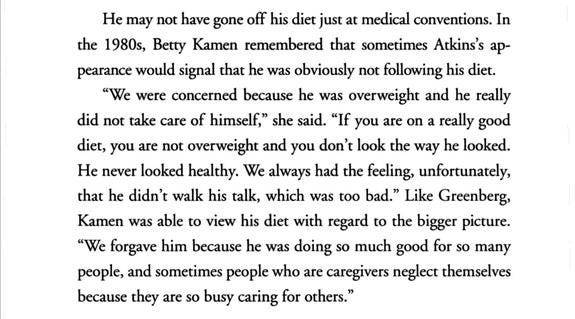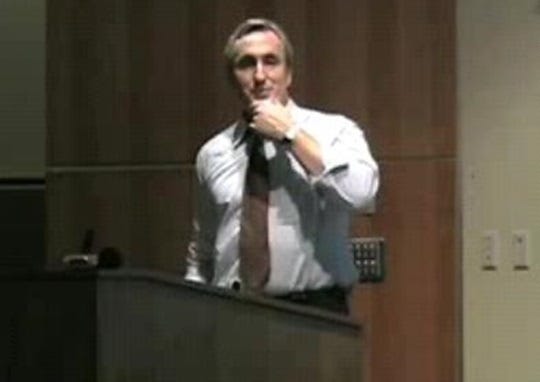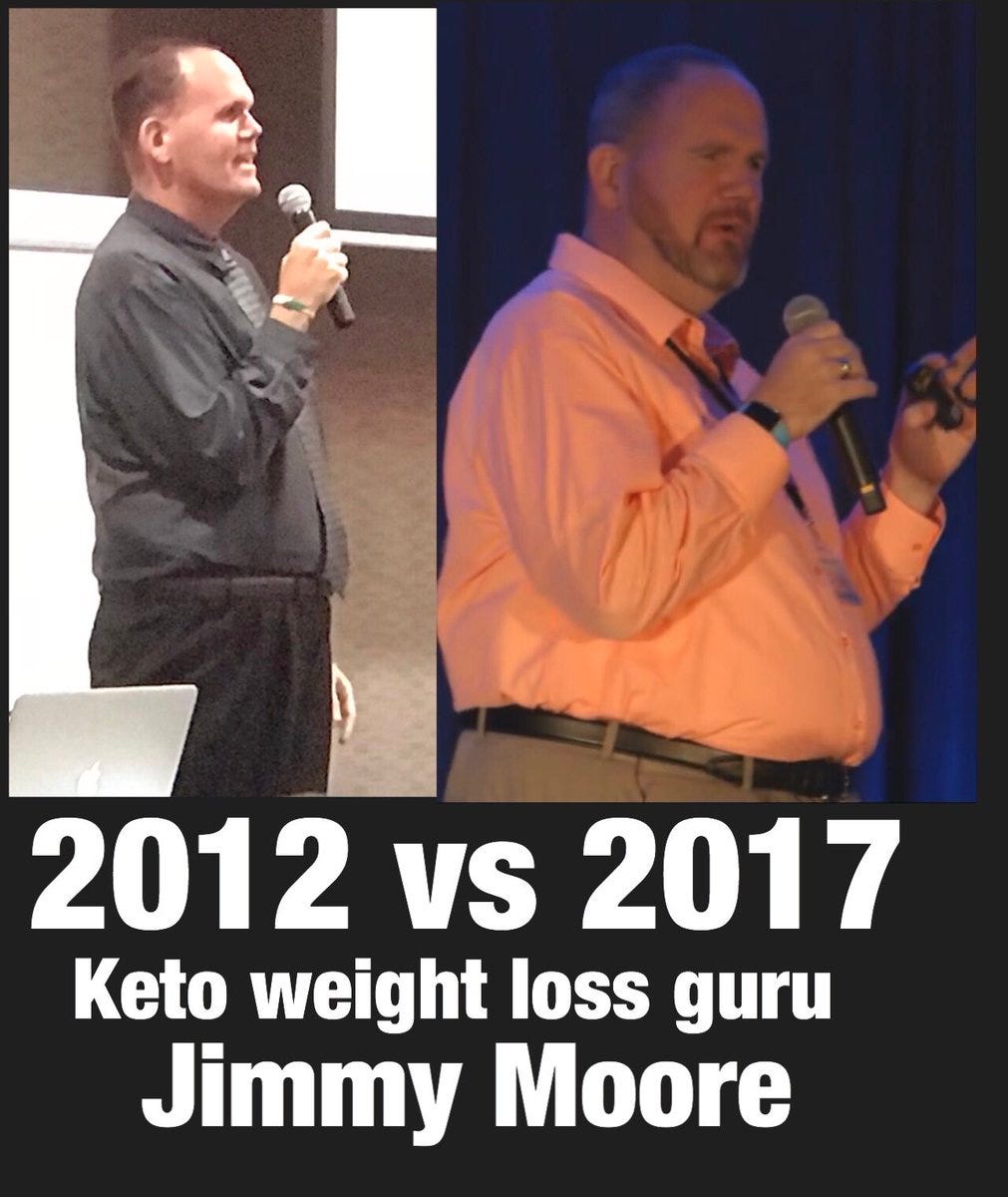The Shameless Pseudoscience of Low-Carb Shill Dr Jason Fung
Meet the keto-spruiking nephrologist upholding the low-carb tradition of calorie-denying pseudoscience.
The Epoch Times, normally a notch above its mainstream media cousins, recently dropped the ball by running an article titled "The Astonishing Overeating Paradox". I rolled my eyes when I saw the author was none other than Dr Jason Fung, a vocal keto charlatan with a penchant for virulently attacking those who disagree with him.
Predictably, the article was the usual excursion into the low-carb la la land of pseudoscience, where obesity is blamed on anything and everything except its actual, ultimate and scientifically verified cause:
A calorie surplus.
In Fung's case, the cause of obesity is "hormones". He doesn't say which ones, but if you click on the hyperlink it takes you through to an article where he drones on about "Peptide YY" and how attempting to lose weight through "calorie restriction only" is doomed to fail because it makes you crazy hungry, which then causes you to overeat, and hence gain weight.
Say that again, Jason? Overeating causes you to gain weight is what you said, right?
Sounds like confirmation of calories in, calories out to me!
By the way, unless dealing with people so morbidly obese that exercise is impractical, no reputable weight loss commentator recommends losing weight by "calorie restriction only." Neglecting exercise when attempting to trim down is a fool's game. Fung is conveniently tailoring his argument by using a strawman.
So Who is Jason Fung, Exactly?
According to his website, Fung "is a Toronto-based nephrologist (kidney specialist) and a world leading expert in intermittent fasting and low-carb diets."
His website prominently features a quote from the Daily Mail (an impeccable scientific source, not) that reads:
“The doctor who invented intermittent fasting.”
What?!
Nowadays, the term "intermittent fasting" is applied to a very broad array of food abstinence patterns. Everything from completely avoiding food every second day to skipping breakfast now seems to fall under the banner of IF.
Whatever version of IF you might subscribe to, Fung did not invent it.
Muslims have been practicing intermittent fasting, in the form of Ramadan fasting during daylight hours, for over 1,400 years.
In modern times, the recorded use of periodic fasting as a weight loss strategy dates back at least to 1915, when Harvard doctors Folin and Denis described the effects of repeated short fasts on two "extremely obese" women.
Jason Fung didn't invent diddly squat, but let's give the guy some credit: He has taken the low-carb penchant for reality denial to a new level.
Fasting involves abstinence from food. Food contains calories. So if you lose weight via fasting, intermittent or otherwise, you did so because you reduced your calorie intake.
Duh.
Over the years, I've gradually steered away from calling out diet and health grifters. While I believe it's important to call out charlatans and their false claims, it tends to be a time- and energy-intensive process that brings little in the way of tangible reward. The 'gratitude' for your efforts often manifests as a barrage of nasty, hateful comments and spam from angry cowards.
To date, I've ignored Fung and his arrogant, cocksure approach to dietary 'science'. He has the attitude of a smack-talking WWE wrestler; sadly, that's about the same intellectual level where his scientific claims reside.
Fung first registered on my radar back in 2016, when he penned a rambling article titled "Here’s $5, Kevin Hall, go buy yourself a clue."
Fung's Conor McGregor-style title and accompanying article were part of the collective temper tantrum thrown by the low-carb camp after the publication that year of a study comparing a ketogenic diet with an isocaloric high-carbohydrate diet. That study was headed by Kevin D Hall from the NIH's National Institute of Diabetes and Digestive and Kidney Diseases, Maryland.
There's a backstory behind that study involving yours truly, a pseudoscientific low-carb author by the name of Gary Taubes, and the metabolic ward research into low-carb weight loss diets, which I've discussed here and here.
In short, Taubes and fellow low-carb advocate Peter Attia formed a 'charity' called NuSI that the duo used to fatten their bank accounts with a hefty $2.1 million of other people's money in only four years. The official purpose of their lucrative 'non-profit' was to fund research into low-carb diets and obesity. The Hall et al study was partially funded by NuSI, using money that Taubes and Attia reeled in from others under the pretext of advancing nutritional science and conquering obesity (needless to say, NuSI failed on both counts).
The Hall study was a metabolic ward study. It was the low-carb camp's equivalent of The Great White Hope, the study they believed would finally silence the likes of yours truly, who had been emphatically pointing out since 2005 that metabolic ward studies - the only scientifically valid test of isocaloric diets - repeatedly showed no difference in fat loss between high- and low-carb diets.
So when the study failed to find any fat loss advantage for a ketogenic diet (as numerous ward studies had previously failed to do), the low-carb movement collectively spat its dummy and turned on Hall.
The low-carb 'community' reminds me of a bunch of petulant children who won't stop screaming and sulking whenever they don't get their way.
So what was so bad about the Hall study?
The Hall et al study featured seventeen overweight and obese men (BMI 25-35) who reported being weight stable for the previous 6 months. All subjects were confined to metabolic wards throughout the study with no access to outside food.
For the first four weeks of the study, the subjects consumed a high-carbohydrate diet providing a mean 2,739 calories and 338 grams of carbohydrate daily.
For the following four weeks, the subjects were switched to a ketogenic diet providing a mean 2,738 calories and 36 grams of carbohydrate daily.
Both diets provided 104 grams of protein daily.
Immediately, we see a flaw with the study. The subjects should have been assigned to follow the diets in random order - e.g., 9 subjects to follow the keto diet for the first four weeks, 8 subjects to follow the mixed diet for the first four weeks, then vice versa for the next 4-week intervention period. This is what most researchers usually do, because they are aware that a change in diet itself can have transient effects on biochemistry and metabolism. Switching up the diet order via randomization helps alleviate possible confounding effects caused by sequencing of the the intervention diets.
To muddle things further, the researchers declared the high-carbohydrate diet as the "baseline diet" instead of treating it like one of 2 intervention diets. They used the first 13 days of the high-carbohydrate diet as the "energy intake adjustment" phase. This is where they determined each subject's maintenance calorie requirements and adjusted their diet to achieve weight stability. This is something that should have been done prior to the main study, not after the study had already kicked off. In a moment I'll discuss some properly conducted studies, and you'll see that both featured weight stabilization periods before the actual interventions on trial began.
Fung, however, isn't fussed by any of the above. In fact, he calls the data from this study "excellent". As you'll learn shortly, there is no study design too sloppy for Fung - he even considers unverifiable experiments of one to be "absolutely brilliant".
So what's his problem?
Fung's issue with the study is simple: Hall et al had the temerity to report exactly what the study found, which was absolutely no advantage for the ketogenic diet when compared to the high-carbohydrate diet.
The subjects lost a mean 0.8 kg of body weight over the last 15 days of the high-carb "baseline" diet period, with 0.5 kg of this "unintentional" weight loss coming from body fat. The body weight and composition changes indicated a calorie deficit of 373 calories per day.
Commencement of the ketogenic diet was followed by a rapid additional 1.6 kg of weight loss, most of which was no doubt water loss because fat mass decreased by only 0.2 kg over the next 15 days. Over the entire 28-day keto period, the total weight lost was 2.2 kg, with 0.5 kg from loss of body fat. The energy deficit during the last 2 weeks of the ketogenic diet was calculated to be 242 calories.
While I think the study design was rather dopey, there is nothing unusual about those results. Anyone who has built their weight loss knowledge base by reading the science, as opposed to hyperbolic nonsense on the Internet, will know those findings are pretty much what we would expect given the degree of calorie restriction and the diuresis that accompanies drastic reductions in carbohydrate intake.
The researchers found "marginal increases" in metabolic chamber-measured energy expenditure and energy expenditure during sleep. These data, said the researchers, suggest drastic changes in carbohydrate intake transiently increase energy expenditure by around 100 calories per day after adjusting for body weight and composition. They add that the body weight and composition adjustments likely overestimated the EE changes during the ketogenic diet "because much of the weight loss was likely from water rather than loss of metabolically active tissues."
The transient increase in energy expenditure may have been due to increased catabolism of protein during the ketogenic diet. We know these diets have been observed to increase catabolism, especially under hypocaloric conditions. The process of creating glucose from protein is known as gluconeogenesis, and is a more energy-intensive process than simply using carbohydrates for glucose (carbohydrate). Hall et al don't provide much information on lean mass changes but they do note:
"Urinary nitrogen excretion increased by 1.5 g/d during the KD phase and indicated significantly increased protein utilization."
What we do know is that, whatever marginal changes occurred in energy expenditure during the keto diet, they had SFA effect on weight and fat loss. For all Fung’s pseudoscientific rabble about “hormones” being the woohoo, hey ho let's go, super duper ultimate determinant of weight and fat loss, this study showed the metabolism "boosting" hormones adrenaline and norepinephrine slightly decreased on the ketogenic diet.
Free and total tri-iodothyronine (the key thyroid hormone known as T3) "were significantly decreased" during the ketogenic diet.
Sorry folks, but cutting carbs is not going to turn your body into a fat burning furnace. Not by a long shot. The only way carbohydrate restriction will cause you to lose weight is if the act of cutting carbs simultaneously induces a caloric deficit.
None of this, of course, matters to Fung. He suffers from the very same preconceived bias that he repeatedly (and unfairly) accuses Hall of in his ranting article.
He can’t dispute any of the above. As noted, he calls the data from this study “excellent.” So instead, he releases his pent-up frustration by accusing Hall of putting a “spin” on the results. Confirming his status as a person of questionable mental coherency, Fung completely goes off the deep end and writes:
"According the Halls assumption, you should therefore simply continue eating the SAD with 25% sugar and expect to lose weight indefinitely. Go ahead. See what happens. I already know. So do you. You’ll get fat, you’ll get type 2 diabetes, and then eventually, I’ll put you on dialysis and chop off your feet when they go gangrenous. But at least Hall can say that he was right." (sic)
Good Lord.
For starters, nowhere does Hall recommend anyone to follow a "25% sugar" "SAD" diet, nor does he claim that by doing so they can lose weight "indefinitely".
Here's what Hall et al actually concluded in their paper:
"In summary, we found that a carefully controlled isocaloric KD coincided with small increases in EE that waned over time. Despite rapid, substantial, and persistent reductions in daily insulin secretion and RQ after introducing the KD, we observed a slowing of body fat loss. Therefore, our data do not support the carbohydrate–insulin model predictions of physiologically relevant increases in EE or greater body fat loss in response to an isocaloric KD. However, it is possible that dietary carbohydrate restriction might result in decreased ad libitum energy intake — a prediction of the carbohydrate-insulin model that was not tested in the current study but deserves further investigation." (Bold emphasis added)
That's a truthful summation of what the study found. The role of researchers is to conduct studies and impartially report the results - not to modify or distort their findings in order to prevent diet zealots from becoming butt-hurt.
The researchers even offered the possibility that cutting carbohydrates might result in decreased calorie intake that leads to weight loss, but acknowledge their study was not equipped to test the possibility. But that's not good enough for Fung and his fellow low-carb zealots, who rabidly reject the fact that calories are the determinant of weight loss, instead insisting in the face of decades of contradictory evidence that low-carb diets instead offer some magical "metabolic advantage".
In all my years offering dietary commentary, I've never met a group of people - aside from vegans - who are so stubbornly committed to a dietary ideology that has repeatedly been disproved by controlled scientific experimentation.
If Fung doesn't like the Hall et al study (neither do I, quite frankly, but not because the study was given misleading spin - it wasn't), there are still the dozens of ward studies dating back to 1935 that he could defer to. But like the rest of his angry comrades in the clown world of low-carb, he blissfully ignores them.
That's because they too show that low-carb diets offer no weight loss "metabolic advantage".
So what sort of research does Fung consider suitable for determining the real cause of weight loss?
Hold onto your seats folks, this is where things get dumber than dumb.
Meet Sam Feltham
I've had numerous low-carb fanatics write to me over the years, virulently impugning my virtue and assuring me they ate thousands more calories per day yet lost weight after switching to a low-carb diet, something they allegedly could not do on their former high-carb 'low calorie' diet. I was apparently supposed to accept these unverifiable claims, from people whose demeanor and language indicated questionable mental coherency, as concrete proof that both I and all the ward scientists who had already disproved such claims were wrong.
My routine response was to invite these folks to confirm their nonsensical claims - and their place in history as metabolic freaks of nature - by booking into a metabolic ward themselves.
None ever took up my offer.
Several years ago, a chap called Sam Feltham scored his 15 minutes of fame after claiming on his blog he gained 'only' 1.3 kg after allegedly consuming 5,800 calories per day on a low-carb diet for 21 days, yet gained 7.1 kg after 21 days on a mixed diet supplying identical total calories.
Fung, who caustically criticizes the authors of tightly controlled ward studies, cites Feltham's unverified claims in his Epoch Times article as if they are scientific proof of the non-existent low-carb "metabolic advantage". In his trademark carnival barker fashion, Fung calls Feltham's self-reported experiment as "absolutely fantastic" and "absolutely brilliant".
I just love the way these low-carb zealots ignore or dismiss tightly controlled ward studies yet cite their unverified, anecdotal delusions as Holy Gospel.
According to Fung and Feltham, the 7.1 kg weight gain the latter allegedly gained on a mixed diet is what "standard calculations" predict from eating almost 6,000 calories per day for 21 days.
Whose "standard calculations," exactly? No reputable scientist will tell you you can gain 7.1 kg in only 21 days by eating 5,800 calories of any type of diet.
Heck, I'd love to be able to tell you that, in your next bulking cycle, "standard calculations" show you can expect to gain 15 pounds drug-free in only 21 days simply by eating 5,800 calories per day, but I'd be spouting egregious nonsense - just like Fung and Feltham.
Lets quickly look at ward research by real scientists to get an idea of what kind of weight gain really is possible over 21 days. Both of the following studies, and several others, will be discussed in more detail in an imminent article I'm putting together for paid subscribers. Here I'll quickly recount the relevant key findings.
The first study was a randomized, controlled trial from Denmark that compared two hypercaloric diets, containing 78% and 31% of calories from carbohydrate, respectively. Both diets contained 11% protein, the remainder of calories coming from fat.
Twenty healthy young men were divided into pairs and, after an initial baseline period to determine their maintenance requirements (NIDDK researchers, are you listening), they were housed in the metabolic ward and overfed 1,194 calories above maintenance for 21 days.
Each person in a pair was randomly assigned to the high-carbohydrate or high-fat diet, acting as ‘Siamese' twins in order to keep the physical activity similar in each pair during the study. Average baseline weight in the higher-carb group was 76.4 kg, compared to 73.4 kg in the high-fat group.
Unlike most ward studies, the subjects did the shopping themselves and prepared their own meals, weighing and recording all food items in accordance with the recipes and instructions given. The research staff regularly, but unannounced, confirmed that the meal preparations and the recording of intake of food, drinks, snacks and sweets took place in accordance with the instructions.
During the overfeeding phase, the high-carb, low-fat group averaged 4,610 calories per day (60 calories per kg of body weight).
The lower-carb, high-fat group averaged 4,585 calories daily (62.5 cals/kg body weight).
Feltham claims that, at the commencement of both his 21-day overfeeds, he weighed 89.7 kg. If he was truly eating 5,800 calories per day, that gives a daily intake of 64.7 calories per kg of body weight - similar to what the Danish subjects consumed.
The high-carb group in the Danish study averaged 896 grams of carbohydrate daily, compared to 346 grams daily in the high-fat group (3,583 versus 1,385 calories from carbohydrate, respectively).
The high-carb group averaged only 56 grams of fat daily, compared to 289 grams daily in the high-fat group.
At 346 grams of carb daily, the high-fat diet in this study was by no means a ketogenic diet. Nonetheless, the higher-carb diet featured 2.56 times the carbohydrate content of the high-fat diet. According to low-carb dogma, dietary carbohydrates make people fat by raising insulin, which allegedly impairs fat burning and increases body fat deposition via de novo lipogenesis. According to this simpleton-level understanding of biochemistry, the high-carb group should have gained substantially more body fat.
So let's see what actually happened.
After consuming almost 5,000 calories per day on mixed diets over 21 days, high-carb and high-fat groups gained 1.35 kg and 1.58 kg, respectively.
The highest individual weight gain was 3.48 kg (by one of the high-fat subjects).
The highest individual caloric consumption in the study was by another of the subjects in the high-fat group: 6,092 calories. He gained 0.76 kg.
So even if Feltham really did eat 5,800 calories every day during his 21-day keto phase, the 1.35 kg weight gain he claims to have experienced is nothing out of the ordinary. It is hardly reflective of some magical, mystical "metabolic advantage" - to the contrary, it's right in the ball park of what you'd expect from 21 days of eating that level of excess calories.
The 7.1 kg weight gain he claims to have experienced on his isocaloric, 21-day mixed diet, however, is complete bollocks and quickly refuted by actual science.
The Quebec Twins Study examined 12 pairs of identical twins, comprised of healthy, sedentary young men averaging 60.3 kg.
For the duration of the study, the subjects lived on the campus of Laval University. They were housed in a closed section of a dormitory adjacent to the cafeteria where they ate their meals. The subjects were under 24-hour supervision by research assistants who lived with them.
After a 14-day baseline weight maintenance period (hello again, NIDDK researchers), and 3 days of preliminary testing, the subjects embarked on the 100-day intervention. The subjects were fed 1,000 calories over their established weight maintenance, 6 days a week. On the remaining day of each week they were fed their baseline daily energy needs. Subjects were thus overfed during 84 of the 100 days. The macronutrient ratio during this period was 15% protein, 35% fat, and 50% carbohydrate.
The mean energy intake of the subjects during the 100-day period was 62.3 calories per kilogram per day. Again, similar to what Feltham claims to have consumed during his experiment-of-one.
However, the results in this tightly-controlled ward study were very different from what Feltham claimed in his unverifiable blog post. The twins experienced a mean body weight gain of 8.1 kg on their mixed diet - during a period of over 3 months. Feltham claims he experienced the same degree of weight gain on a mixed diet containing similar calories in only 3 weeks.
What utter rubbish.
After Feltham started getting press as a result of his untenable 'experiment', he emailed me out of the blue asking if he could interview me. At the time, I was constantly attracting the ire of low-carb zealots due to my vigorous debunking of their pseudoscience. I'm guessing Feltham, high on his own publicity, figured he'd use his results as a weapon against me and elevate his standing among his chubby compatriots in the low-carb world.
Contrary to what some folks think, I'm not an idiot. Nor do I have endless time to sit around entertaining the delusions of dietary cultists.
So my response to Feltham's invitation was, sure, I'll come on your show - as soon as you complete a stint in a metabolic ward and replicate your nonsensical claims. As a busy individual, I made it clear to Mr Feltham I did not want to hear any more from him until he had done so. With all the intelligence and discourtesy I've come to expect from low-carb fanatics, he of course promptly emailed back, ignoring my ward request and instead asking me again to come onto his show. I reminded Mr Feltham I'd requested no further contact until he'd fulfilled my metabolic ward request, and again reiterated I wanted no further contact until he verified his results in a controlled scientific manner, as opposed to an uncontrolled low-carb blogging charlatan manner.
I did not hear back from Feltham. Whether he was deliberately lying or simply lacked the ability to keep accurate dietary records, I cannot say. What I can say is that his claims were sheer nonsense and if he or anyone else wants to prove me wrong, my metabolic ward request still stands.
Yes, I know, metabolic ward stays aren't free. But as renowned fact-fudger USA Today's "World Fitness Elite Personal Trainer of the Year" (!), Feltham should have plenty of income from his bustling training endeavours to fund a couple of 21-day ward stints. If not, surely Fung, who incessantly boasts of the millions of sales his "best-selling" books have garnered, could loan him the the funds?
Bad Math and Poor Record-Keeping Does Not Constitute a Metabolic Advantage
In Part 1 of my paid series on weight gain, I discussed a Spanish study that compared free-living subjects instructed to follow a hypercaloric keto diet or mixed diet. The mixed diet subjects gained weight and lean mass, whereas the keto diet subjects lost both weight and lean mass. Remember, this was in a study where the subjects were specifically instructed to eat a calorie surplus. This indicates the free-living keto subjects were not only unable to achieve a hypercaloric intake, but in fact consumed a caloric deficit.
It's easy to conclude, when you are eating unprecedented amounts of fatty fare, that you are eating more calories than ever before, and that any subsequent weight or fat loss you experience is the result of some magical property of your new diet. I fell into this trap myself back in the mid-1990s, when I embarked upon Dr Mauro DiPasquale's Metabolic Diet, which involved 5 days of strict keto followed by a weekend of mixed, high-carb fare. I lasted three weeks before ditching the diet due to severe lack of energy. While I felt like a chemo patient towards the end of the three weeks, I did get leaner, and was surprised at how I could get so lean while eating burgers, sausages and fatty steaks. At that point, my low-fat brainwashing was just beginning to crack, and I had not yet begun examining scientific articles.
Looking back, it's not at all surprising. I wasn't carefully recording and calculating my food intake, but simply following Mauro's menu guidelines. If I had been more scientific about the process and calculating my food intake, I would have discovered I wasn't eating as many calories as I'd assumed. I would have factored in the shite ton of calories I had dropped from carbs, of which I was previously eating a lot. I would have had to allow for the considerable loss of fat, and hence calories, when cooking high-fat meats. I also would have had to acknowledge the fact that, at the same time I began the Metabolic Diet, I also began training twice a day, six days a week (this was part of Leo Costa's Serious Growth III program, which is where I first learned of Dr Mauro's diet).
There is nothing magical about low-carb or keto diets. Nothing whatsoever. They don't boost growth hormone, they don't boost thyroid hormones (quite the opposite, in fact), and they don’t magically shed body fat.
But when you get caught up in the hype, it's easy to be convinced that any positive change you experienced is due to some magical quality of the diet, and not simply due to the inescapable reality of calories in, calories out.
I'm older and wiser now, and it's been a perennial source of bemusement when woefully ignorant (and usually flabby) low-carbers have tried to 'educate' me on things that I long since filed away in the "been there, done that” folder.
If you want to lose weight, you need to create a calorie deficit. If you want to gain weight, you need to create a calorie surplus. Period. You should ensure adequate protein during both processes to minimize muscle loss/maximize muscle gain, but there is no magical effect to be gained from cutting carbs. In fact, if you're highly active, a lower carb intake could potentially result in glycogen depletion and impaired performance. Not exactly what I'd call a "metabolic advantage".
Dr Fung's 28-Day Snake Oil Fasting Tea Challenge
While he's helping out Feltham with the finances for a ward stay, Fung should cough up some research funds to confirm his own dodgey marketing claims. I'm talking about his "Fasting Tea" challenge, which he claimed will give you twice the results with “50% the effort” from your next fast.
So what he's leading people to believe is that, if they try a fast that would normally produce a 5 kg weight loss, they will instead lose 10 kg simply by drinking his tea.
What complete and utter hogwash.
He charges US $40 for a 28-serving pack of this tea, which contains unspecified amounts of "Green tea blend, ginger, spearmint, licorice root, lemon peel, orange peel."
There is zero evidence to show that any of those ingredients, alone or in combination, can double your rate of weight or fat loss. Fung has been known to lose his mierda and try to get people fired for saying stuff like this, but what he really needs to do is stop throwing tanties and front up with some actual verified science to support his claims.
Fung's Nasty Streak
In November 2016, Fung posted a tweet featuring an image of Sadaf Farooqi, a neuroscientist at the University of Cambridge, and Kelly Brownell, dean of the public policy school at Duke University. It’s fair to say both are generously proportioned individuals. So be it. They’re researchers, not fitness models.
The duo had just presented at an obesity conference in New Orleans. Fung promptly posted a picture of the two, accompanied with the words "Our obesity 'experts' lecturing physicians. We're in good hands."
What he was saying, of course, was "cop a load of these fatties! And they call themselves obesity experts! Hmmmph!"
This, of course, triggered an uproar about fat-shaming, with the definitely not-fat obesity researcher Yoni Freedhoff stepping in to defend his esteemed colleagues. Freedhoff and Fung directly communicated over the matter, and the interaction seemed reasonably civil.
That is, until Fung contacted Dr. Freedhoff’s university department & filed a complaint, trying to get him fired from his job!
Seriously.
If someone ever tries to ruin your life, hope and pray that it will be Jason Fung. You see, after receiving Fung's complaint, Freedhoff's employer did not fire him, but instead gave him a promotion!
Now that's the kind of stalker we all need in our life lol.
Turns out Freedhoff is not the only health professional to attract the wrath of Fung. In October 2020, Alastair McAlpine, MD, revealed in a tweet that Fung had also tried to get him fired after he questioned Fung's very questionable cancer claims and tea promotion.
Here's what I find rather bemusing about this fat-shaming saga:
The low-carb arena has long been an absolute haven for fat people who claim to be fat loss experts!
But, for some strange reason, Fung suffers amnesia when it comes to overweight ‘experts’ of the low-carb variety.
The difference between professional researchers and low-carb diet authors - like Robert Atkins, Michael Eades and Jimmy Moore - is that the latter's claims have been accompanied by a tsunami of marketing BS about how easy and effective their program is for weight loss.
Which begs the obvious question: Why were they fat?
I get that professional researchers are busy people who may neglect their own physical condition. I’m not making excuses for them, but I understand how and why it happens.
However, save for temporary injury or illness, there's absolutely no excuse for some spruiker pimping him/herself as a fat loss expert, and his diet as a "revolution", to be sporting a generous spare tire around his/her waist.
The cover of the Eades’ Protein Power, for example, claims their diet is the "Way to Lose Weight, Feel Fit ... in Just Weeks!"
But when the book hit the best-seller lists and Eades and his wife were invited on to a TV show to discuss their book, the producer promptly demanded they wear girdles because they were ... fat.
In Dr. Robert Atkins: The True Story of the Man Behind the War on Carbohydrates, we learn that Atkins' staff joked about his overweight. We learn the most famous weight loss guru of all time was in fact overweight and “never looked healthy.”
When Atkins died, there was an uproar about his 258 lb corpse, which suggested he was very obese. His wife and Atkins-employed physician Stuart Trager vocally objected to the obesity claims, insisting the late guru gained 60 pounds of fluid while in a coma. By their own admission, however, Atkins weighed 195 lbs shortly after being admitted, which at 6 foot endowed him with a BMI of 26.4, placing him in the "overweight" category. While it is indeed possible for lean, muscular individuals to have BMI scores that erroneously place them in the overweight category, anyone who's ever seen a picture of Atkins knows he was no musclebound athlete.
Then there's Gary Taubes, who Fung repeatedly cites in a glowing manner. Which is curious, because if Fung believes it's important to call out chubby obesity 'experts', he really needs to start calling out Taubes. Here’s his insulin-hating idol, presenting his fat loss ‘expertise’ whilst sporting an ample gut.
And then there's Fung's buddy Jimmy Moore, the now-incarcerated sex offender who was never lean and was always in appalling shape. Have a look at the images below. Even when Moore was 'slim', he was fat! Ask yourself why Fung - who tries to get people fired for objecting to his fat-shaming - never fat-shamed this truly shameful creep?
Either Jason Fung is a hypocrite, or he needs to find a new optometrist.
Here's $5, Jason Fung, go buy yourself a clue. Along with some ethics, manners, and congruity.












